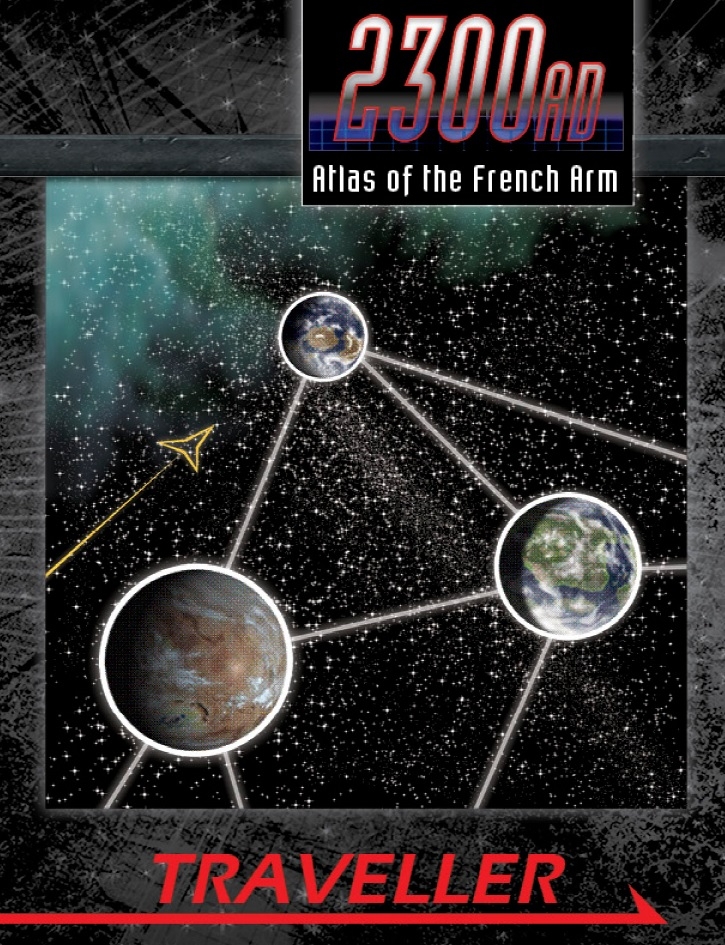2300ad: Atlas of the French Arm
This review originally appeared on RPG-Resource.org in March 2016, and reprinted in the May/June 2016 issue.
 2300AD:
Atlas of the French Arm. Colin Dunn.
2300AD:
Atlas of the French Arm. Colin Dunn.
Mongoose Publishing http://www.mongoosepublishing.com
240pp., PDF
US$23.99/UKú16.99
In the French Arm, you’ll find the oldest, richest colonies, many of big enough and strong enough to survive as nations in their own right. Here is a mammoth work, atlas and gazetteer and source of many an adventure idea, to fuel your party’s explorations and adventures here.
Exploring the French Arm, the first chapter, gives an overview of the history and current state of affairs. It paints a picture of a living dynamic area, with various tensions and problems arising, being resolved or then fading away again, layering to create the present-day situation. It also shows how the use of languages has followed, with both French and English being useful for the would-be spacefarer.
This follows on naturally into the next section, Conflict on the French Arm. To start with, things were peaceful with exploration rather than conflict occupying people’s minds, but of late things have become more contentious. Many conflicts have their origin in squabbles back on Earth that have spilled over to space, with colonies perpetuating the differences begun on Earth and indeed sometimes acting as their proxies. There have also been minor skirmishes as different factions and groups have butted heads. Most recently, however, the source of conflict has come to the Arm with the ever-mounting threat posed by the Kaefers.
Next is a chapter on Organisations, those extra-governmental entities that have a profound effect along the French Arm, influencing policies and decision making across over a dozen systems and countless worlds. Many are commercial in nature, massive corporations that rival governments in scope and influence. Some are ‘private security companies’—mercenaries for hire, in other words. There are also those organisations lumped together under the term ‘foundations’ being any non-governmental, non-commercial group. Several dedicate themselves to ‘pure science’ or so the PR goes, although they’re not backwards in monetising their discoveries. And of course there are terrorists, outlaws and organised crime, pushing their ‘cause’ or merely lining their own pockets at everyone else’s expense. In some way, most of these will impact on anyone visiting the French Arm—suppliers, employers, enemies or allies… or just names in a news bulletin.
Then comes a chapter entitled Libertines. These are the folk who occupy a niche on the spacelanes equivalent to where Romany or Gypsies or Travellers fit in on Earth. It’s a fascinating web of relationships and concepts, wrapped up and living in space, roving the French Arm although they are actually more prevalent in the Chinese Arm. Families are at the core of their culture, with ships crewed and run by extended families, some of whom we meet here. In similar vein the next chapter deals with the Belters, those fiercely independent souls who mine asteroid belts for whatever valuable materials they can find.
Next we hear of Mysteries of the French Arm. The tall tales you hear in spacer bars. Strange ruins predating exploration. Unidentified alien objects, some being actual artefacts, others glimpses in the distance… and this leads neatly in to a chapter on Intelligent Life, there being at least three known non-human intelligent races to be found in the French Arm—the Pentapods, the Kaefers and the Arbors.
Scene now set, we move on to the Atlas proper. In the fairly large volume of space there are but twelve inhabited colony worlds, with many systems lacking really habitable worlds although many sport outposts. There’s a quite lengthy discourse on ‘planetology’, the science of describing star systems, showing what the various descriptors applied in the Atlas to follow mean. First up, however, are the Outposts—small settlements that are not fully-fledged colonies in their own right but which serve as way-stations on the route to someplace else or which have other purposes.
The listing of outposts is followed by a chapter on Colonies, which introduces the twelve colony worlds. They then get a chapter apiece, with all the information you need to understand what they’d be like to visit in the course of your adventures. For each, there is system data, notes on each planet and the settlements upon them, then the history, native wildlife and more about the mainworld that is the colony itself. Maps, weather charts, a wealth of detail to enable your party to visit or even settle there.
This raises the question: is this a book for all players or the referee alone? The answer is, probably a bit of both. Most of the information here could be researched by an interested character, some at least will be covered in a normal education or is the sort of thing you pick up if you pay attention to documentaries and travel shows. It’s possibly best to restrict access a bit, but when direct enquiries are made be open about the information that answers that enquiry… but no more. Make players work for the information, but provide it when they do.
Finally there is a chapter called Exploratory Worlds. This provides details of just a few of the worlds that have been charted but barely visited yet—ideal for a game in which exploration of new worlds is to be a feature. There’s enough here to get you started and plenty of scope to develop them however you wish.
In short, this is a massive and excellent resource for anyone planning games set in the French Arm. It makes you want to take ship and visit forthwith…
 Freelance
Traveller
Freelance
Traveller